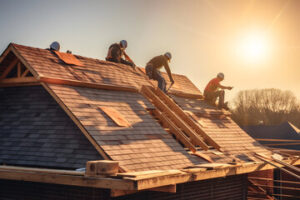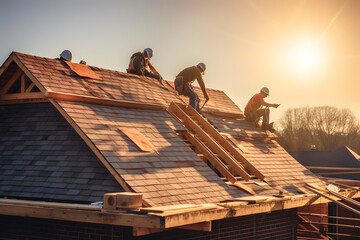A reputable roofing contractor should have a solid track record of satisfied customers. Check out online reviews and ask for references. Detailed feedback is often the best indicator of the contractor’s professionalism and reliability.
Quality content that naturally incorporates keywords increases search engine visibility and positions the roofing contractor as an authority in the industry. Contact Bears Valley Roofing Contractor for professional help.
Licensed roofing contractors offer several advantages, including expert craftsmanship, legal compliance and reliable service. Choosing the right roofing contractor is essential to your home’s safety, aesthetic and value.
Whether you’re looking to have your roof repaired or a new roof installed, it’s important to find a licensed roofing contractor. A licensed contractor will have the specialized equipment and tools necessary to complete the job correctly. They will also be able to provide you with a detailed estimate and warranty for your peace of mind.
In addition to licensing, a professional roofing contractor will have liability insurance. This insurance protects the roofing contractor and the homeowner in the event of an accident or damage during the project. Additionally, the insurance will cover any costs associated with property damage or injuries to employees. Licensed roofing contractors will also have worker’s compensation insurance, which covers employees in the event of an injury while working on your home.
Liability insurance is not only a requirement for contractors, it’s also a way to show that the roofing company cares about its customers and employees. Having this type of insurance shows that the roofing contractor is committed to meeting industry standards and providing quality work.
Depending on the roofing contractor, you should inquire about the manufacturer and workmanship warranties that they offer. The length of these warranties varies, and can be beneficial in the event of future repairs or replacements. The roofing contractor should be able to clearly explain the terms of these warranties so you can make an informed decision about your project.
Another important question to ask is about the roofing contractor’s environmental liability coverage. If the contractor uses products that could cause pollution, a Contractors Pollution Liability (CPL) policy can help. This type of insurance typically provides coverage for Bodily Injury and Property Damage claims related to the release of pollutants into the air, soil, or surface water. It may also include other exposures like Mold, as well as additional coverage options such as Non-Owned Disposal Site and Natural Resource Damages coverages.
Licensed roofing contractors are qualified professionals that have extensive experience in their trade and have passed background checks and inspections. They can help you choose the best roofing materials and complete your project on time and within budget. They are knowledgeable about local building codes and regulations, and will be able to help you with any issues that arise during the construction process.
Offers a Warranty
You may not think about it often, but a warranty is a valuable safeguard that can help protect you from costly mistakes. For example, if your roof is installed improperly and the materials don’t hold up, you could lose your investment and face significant costs to repair or replace it. That’s why reputable roofing contractors typically offer a workmanship warranty. This covers any repairs or replacements due to errors in building techniques for a set period of time.
Similarly, most established roofing contractors also offer a manufacturer’s product warranty, which provides protection from defects in the materials for a specific amount of time. However, the terms of these warranties differ widely, and it’s important to know which ones you have before committing to any project.
For instance, some manufacturers only provide a non-prorated warranty for the first 10 years of the life of your roof, while others offer a prorated warranty that decreases over time. This is a bit like a dishwasher that comes with a 10-year manufacturer’s guarantee, and then the dishwasher breaks down at year 9, you might only get $100 back from the company.
Another thing to look for is whether your roofer offers an extended warranty, which can be purchased in addition to a standard manufacturer’s warranty. An extended warranty can broaden the coverage of your roofing system to include other components such as underlayment and barriers against ice and water, and it may offer additional benefits like non-proration or unlimited transferability.
It’s also worth checking if your contractor is licensed and insured. This is an essential sign that they take their responsibilities seriously and have the right insurance in place to protect you from any mishaps that could occur during your project. It’s a good idea to ask for proof of insurance before agreeing to any work and check online reviews of roofing companies for customer feedback and testimonials. If a company doesn’t provide this information, it’s best to move on and find a different roofing contractor. There are plenty of options out there, and it’s worth taking the time to shop around to find one with a solid track record.
Provides a Written Estimate
The estimate should provide a detailed breakdown of all expenses associated with your roofing project. It should include all materials, labor, and disposal costs, as well as warranties and any other details that may impact your investment. This will help you avoid surprises down the road. In addition, you should expect to see options and details outlined in the roofing estimate, such as different shingle types and brands, drip edge, underlayment, ice and water shield, and ventilation.
The roofing contractor should be able to answer any questions you have about the estimate, and they should not try to pressure you into making a decision. If they do, this is a red flag that they might not be the best fit for your project.
It is important to verify that the estimate includes all necessary work, including inspection, removal of existing shingles and any other components, repair or replacement, and clean-up. In addition, the estimate should specify any fees for building permits or dumpster rental. It should also include any contingencies that could arise during the roofing process, such as the discovery of rotted wood or unexpected damage to other parts of your home that needs to be addressed.
Whether you’re looking for a roof repair or full replacement, it is critical to obtain multiple estimates from reputable contractors. Look for fair pricing that balances quality materials with skilled workmanship. Be wary of prices that are significantly lower than others, as this can indicate poor quality materials or shortcuts in the installation that will lead to future problems and costly repairs.
A good roofing contractor will offer both a manufacturer and workmanship warranty on the materials used in your project. The duration and coverage of these warranties will vary, so be sure to review them carefully. You should also ask the contractor to detail how they will safeguard your property during the work, such as tarping and protecting windows and landscaping.
A good roofing contractor will be able to explain the terms and conditions of their warranty and will have no problem providing you with all the information you need in order to make an informed decision. In addition, they will provide you with a detailed contract that clearly outlines the scope of work, payment schedule and terms, warranties, and any other relevant details.
Prioritizes Safety
Roofing projects can be dangerous, but safety should always be a priority. The right contractor follows strict safety protocols to protect their team and your property. They are also familiar with local building codes and regulations, ensuring your project complies with all legal requirements. This helps avoid potential fines and other legal issues that can delay your project and cost you more money in the long run.
Working on roofs can pose many risks, including falls from height, electrical hazards, and injuries from tools. A good contractor prioritizes safety by following strict protocols and establishing a culture of safety awareness among their team. This includes regularly conducting safety meetings and training sessions, as well as implementing a system for reporting safety concerns.
The most significant risk of a roofing project is falls from height, which can cause severe injuries or even death. To mitigate this risk, contractors use a variety of fall protection systems, including guardrails and safety nets. They also take precautions to prevent electrical hazards by avoiding working near power lines and using non-conductive equipment. They also provide proper training to ensure workers know how to use ladders safely, including securing them properly and maintaining three points of contact when climbing.
Roofing can also involve working on steep slopes, which increases the risk of falls. To reduce this risk, contractors make sure to tie off workers when they are working on hazardous areas, and they clearly mark roof penetrations like skylights and vents. In addition, they monitor weather conditions carefully and suspend work when necessary to protect workers and equipment from unsafe conditions.
While a little calculated risk comes with any job site, it doesn’t mean accidents have to happen. A safe job site protects your workers, lowers insurance costs, and eliminates the kind of delays that can derail a project and damage your reputation. In addition, it shows clients that you’re committed to doing the job correctly and protecting their investment. To ensure a safe project, homeowners can also play an important role by selecting reputable contractors, clearing the work area, staying informed about the project status, securing pets and children, and understanding emergency procedures.
